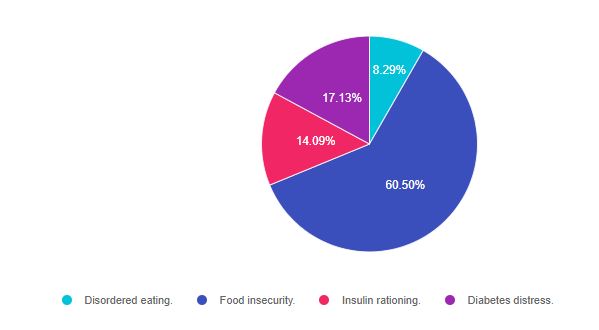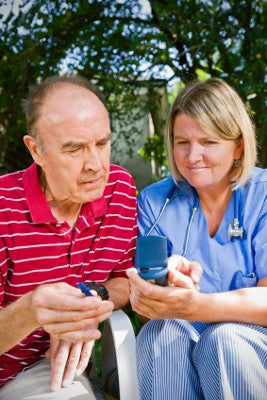
In the 2021 ADA Standards of Care, there is an intentional and focused discussion of health barriers to diabetes self-management. Our January 5th Question of the Week alluded to how Social Determinants of Health can impact diabetes management. Over 60% of respondents chose the best answer!
Before we start though, if you don’t want any spoilers and haven’t tried the question yet, you can answer below: Answer Question
Question: LS has type 1 diabetes and reports to the clinic with unusually frequent hypoglycemia and some weight loss. LS appears distraught and says that since the pandemic, their work hours have been dramatically reduced and paying bills has been a struggle. Based on this information, which of the following topics would the diabetes specialist most want to explore further?
Answer Choices:
- Disordered eating
- Food insecurity
- Insulin rationing
- Diabetes distress

As shown above, the most common choice was option 2, the second most common answer was option 3, then option 4, and finally option 1.
Getting to the Best Answer
If you are thinking about taking the certification exam, the content of this practice test question will set you up for success. This question identifies if the test taker can identify how social determinants can impact health.
Answer 1 is incorrect. 8.29% chose this answer. “Disordered eating.” Even though this is a tempting answer, the facts in the question don’t support this answer. If LS was struggling with disordered eating, glucose levels would be elevated due to under insulinization to promote hyperglycemia and weight loss. People with diabetes and disordered eating reduce their insulin dose to induce chronic hyperglycemia which leads to weight loss.
Answer 2 is correct. 60.50% of you chose this answer. “Food insecurity.” People with diabetes are at higher risk of food insecurity. During the pandemic, many people aren’t able to work and lack access to adequate food.
In this situation, hypoglycemia coupled with weight loss indicates that LS is not consuming enough calories to match their insulin dose.
Given that LS has less income, it makes sense that they may not be able to afford adequate food. Providing LS with local resources to food banks and social services plus helping them take less insulin to prevent hypoglycemia, are both important topics to discuss during the visit.
Answer 3 is incorrect, 14.09% of you chose this answer “Insulin rationing.” If LS was rationing or taking less insulin than usual to make it last longer, they would not be struggling with hypoglycemia, but would instead be experiencing hyperglycemia.
Answer 4 is incorrect, 11.48% of you chose this answer. “Diabetes distress.” Certainly, LS is experiencing distress, but the main issue in this situation is safety and preventing hypoglycemia. The hypoglycemia is not a result of distress, it is due to lack of adequate food. Providing LS with local resources to food banks and social services plus helping them take less insulin to prevent hypoglycemia, are both important topics to address during the visit.
We hope you appreciate this week’s rationale! Thank you so much for taking the time to answer our Question of the Week and participate in this fun learning activity!
Food Insecurity – An Important Topic
Section 1 in the ADA Standards, Improving Care and Promoting Health in Populations, takes a close look at the social determinants of health that can act as barriers to self-care. As diabetes advocates, we can ask these 2 Food Security Screening questions (see slide below) to assess for inadequate access to food and provide needed resources and referrals.


Want to learn more about this topic?

We have updated this course to reflect the 2021 ADA Standards of Care. This presentation includes the latest information on Social Determinants of health, assessment strategies, and approaches. We explore the psychosocial issues that can discourage individuals from adopting healthier behaviors and provides strategies to identify and overcome these barriers. Life studies are used to apply theory to real-life situations. A great course for anyone in the field of diabetes education or for those looking for a new perspective on assessment and coping strategies.
Topics include:
- Name assessment areas of healthy coping
- List psycho-social and emotional barriers
- Provide strategies for healthcare professionals to identify and overcome barriers
- Discuss strategies to develop an individualized diabetes education plan

Instructor: Beverly Thomassian RN, MPH, CDCES, has been Board Certified in Advanced Diabetes Management for over 20 years. She is an Associate Clinical Professor at UCSF and Touro University and a nationally recognized diabetes expert.
Sign up for Diabetes Blog Bytes – we post one daily Blog Byte from Monday to Friday. And of course, Tuesday is our Question of the Week. It’s Informative and FREE! Sign up below!
[yikes-mailchimp form=”1″]
Accreditation: Diabetes Education Services is an approved provider by the California Board of Registered Nursing, Provider 12640, and Commission on Dietetic Registration (CDR), Provider DI002. Since these programs are approved by the CDR it satisfies the CE requirements for the CDCES regardless of your profession.*
The use of DES products does not guarantee the successful passage of the CDCES exam. CBDCE does not endorse any preparatory or review materials for the CDCES exam, except for those published by CBDCE.








